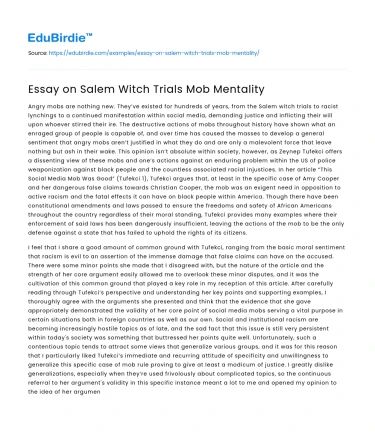Angry mobs are nothing new. They’ve existed for hundreds of years, from the Salem witch trials to racist lynchings to a continued manifestation within social media, demanding justice and inflicting their will upon whoever stirred their ire. The destructive actions of mobs throughout history have shown what an enraged group of people is capable of, and over time has caused the masses to develop a general sentiment that angry mobs aren’t justified in what they do and are only a malevolent force that leave nothing but ash in their wake. This opinion isn’t absolute within society, however, as Zeynep Tufekci offers a dissenting view of these mobs and one’s actions against an enduring problem within the US of police weaponization against black people and the countless associated racial injustices. In her article “This Social Media Mob Was Good” (Tufekci 1), Tufekci argues that, at least in the specific case of Amy Cooper and her dangerous false claims towards Christian Cooper, the mob was an exigent need in opposition to active racism and the fatal effects it can have on black people within America. Though there have been constitutional amendments and laws passed to ensure the freedoms and safety of African Americans throughout the country regardless of their moral standing, Tufekci provides many examples where their enforcement of said laws has been dangerously insufficient, leaving the actions of the mob to be the only defense against a state that has failed to uphold the rights of its citizens.
I feel that I share a good amount of common ground with Tufekci, ranging from the basic moral sentiment that racism is evil to an assertion of the immense damage that false claims can have on the accused. There were some minor points she made that I disagreed with, but the nature of the article and the strength of her core argument easily allowed me to overlook these minor disputes, and it was the cultivation of this common ground that played a key role in my reception of this article. After carefully reading through Tufekci’s perspective and understanding her key points and supporting examples, I thoroughly agree with the arguments she presented and think that the evidence that she gave appropriately demonstrated the validity of her core point of social media mobs serving a vital purpose in certain situations both in foreign countries as well as our own. Social and institutional racism are becoming increasingly hostile topics as of late, and the sad fact that this issue is still very persistent within today's society was something that buttressed her points quite well. Unfortunately, such a contentious topic tends to attract some views that generalize various groups, and it was for this reason that I particularly liked Tufekci’s immediate and recurring attitude of specificity and unwillingness to generalize this specific case of mob rule proving to give at least a modicum of justice. I greatly dislike generalizations, especially when they’re used frivolously about complicated topics, so the continuous referral to her argument's validity in this specific instance meant a lot to me and opened my opinion to the idea of her argument holding ground within the other supporting instances she provides later in the article, those of which I also agreed with. This article made me think greatly about both Christian Cooper’s attempt at de-escalation and recording and the argument of a victim's morality. I cannot imagine how fearful Cooper must have been in such a scenario and the fact that he was able to maintain his composure to both record evidence of a false claim and escape such a deadly trap to completely ensure his physical and legal safety inspires me greatly on an emotional level. Tufekci’s detailed recount of such a story and its inherent issues is an important reminder of the gravity of the state’s failure to uphold the rights of its citizens, especially regarding the racial inequality that many continue to suffer from. All citizens of the United States should have their rights maintained regardless of their race or ability to be a “good person,” and until those protections are secured, the angry mobs will have to fill in the necessary gaps until the active proponents of racism are held accountable.
Save your time!
We can take care of your essay
- Proper editing and formatting
- Free revision, title page, and bibliography
- Flexible prices and money-back guarantee
Did you like this example?
Make sure you submit a unique essay
Our writers will provide you with an essay sample written from scratch: any topic, any deadline, any instructions.
Cite this paper
-
APA
-
MLA
-
Harvard
-
Vancouver
Essay on Salem Witch Trials Mob Mentality.
(2024, February 28). Edubirdie. Retrieved March 13, 2025, from https://hub.edubirdie.com/examples/essay-on-salem-witch-trials-mob-mentality/
“Essay on Salem Witch Trials Mob Mentality.” Edubirdie, 28 Feb. 2024, hub.edubirdie.com/examples/essay-on-salem-witch-trials-mob-mentality/
Essay on Salem Witch Trials Mob Mentality. [online].
Available at: <https://hub.edubirdie.com/examples/essay-on-salem-witch-trials-mob-mentality/> [Accessed 13 Mar. 2025].
Essay on Salem Witch Trials Mob Mentality [Internet]. Edubirdie.
2024 Feb 28 [cited 2025 Mar 13].
Available from: https://hub.edubirdie.com/examples/essay-on-salem-witch-trials-mob-mentality/
copy






 Stuck on your essay?
Stuck on your essay?

